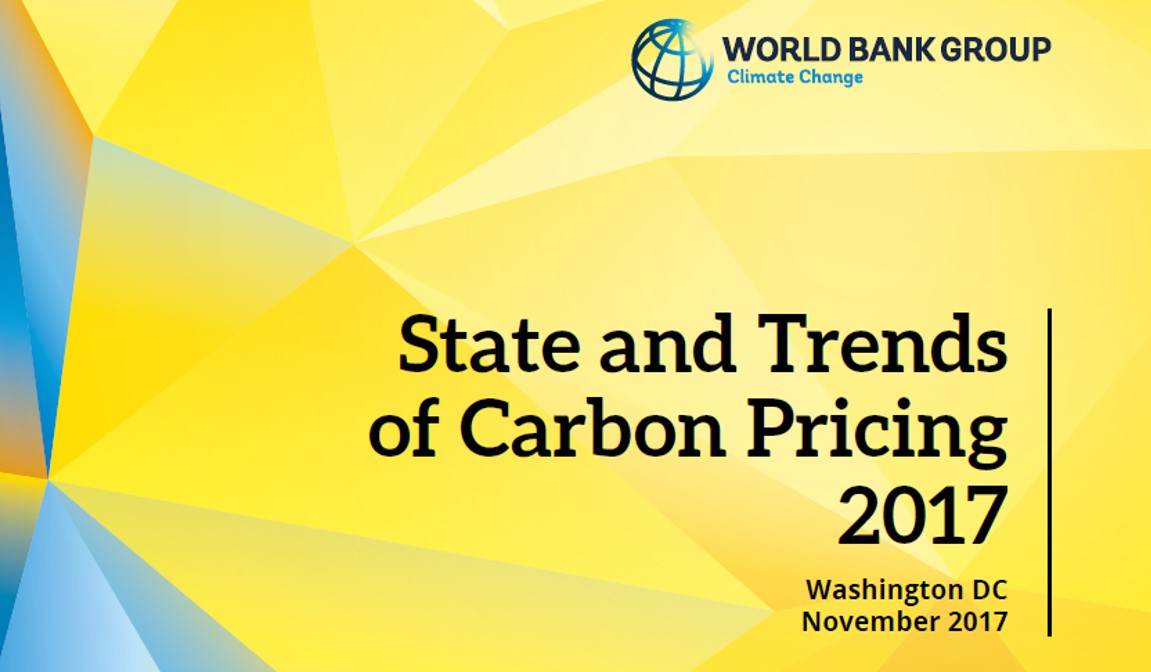Eight new carbon pricing initiatives were launched between 2016 and 2017
More and more countries and sub-national jurisdictions are putting a price on carbon but the level of action must ramp up significantly to help the world meet its Paris Agreement targets, says a new World Bank report.
Launched just ahead of the UNFCCC’s Climate COP23 in Bonn, the annual review: State and Trends of Carbon Pricing 2017, presents good and not-so-good news. On the positive side, the value of carbon pricing initiatives – including emissions trading schemes (ETS) and carbon taxes – reached $52 billion, an increase of 7 percent compared to 2016. And with eight new or enhanced carbon pricing initiatives in place since early 2016 – three quarters of them in the Americas (Colombia, Chile, and several Canadian provinces) – there are now 42 national and 25 sub-national jurisdictions putting a price on carbon emissions.
Together, these jurisdictions raised revenues from carbon pricing of more than $20 billion for the second consecutive year, with the potential to raise much more. The report says revenues could increase to over $100bn a year if existing carbon pricing schemes adopted prices consistent with the Paris Agreement temperature targets.
On the less positive side, the report finds that 85 percent of emissions are still not covered by carbon pricing, and that most current carbon prices are significantly lower than the $40-80/tCO2 by 2020 and $50-100/tCO2 by 2030 that the Stern-Stiglitz High-Level Commission on Carbon Prices found to be consistent with the temperature goal of the Paris Agreement.
“A well-designed carbon price is an indispensable part of a strategy for efficiently reducing greenhouse gas emissions while also fostering growth,” said John Roome, Senior Director for Climate Change at the World Bank. “While we’ve seen progress over the past year, action to expand carbon pricing coverage and to increase prices to deepen its impact has to accelerate.”
The report highlights key areas of progress made since early 2016, including:
- Chile and Colombia launched carbon taxes;
- Three Canadian provinces (Alberta, British Columbia, and Ontario) and one US state (Washington) introduced new or enhanced carbon pricing schemes;
- Mexico is starting a one-year ETS simulation to create awareness on carbon pricing and prepare for the launch of a pilot ETS in 2018; and
- China is gearing up for the commencement of its national ETS, potentially the largest carbon pricing initiative in the world.
The report estimates that an additional US$700 billion a year will be needed annually by 2030 to finance the transition to low-carbon economies. The report builds a vision for an integrated approach that links climate-focused domestic policies and carbon pricing, complemented by effective international cooperation through climate finance from donors and new climate markets, to mobilize resources at the speed and scale required to deliver low-carbon growth, jobs and innovation.
According to the report, domestic resources will need to make a significant contribution, enabled by improved national policy environments — including carbon pricing — to catalyze increased private sector investment. International climate finance will remain important and could be targeted where it is most effective at supporting the low-carbon transition and to promote the development of climate markets. As climate markets develop, they could play a larger role in mobilizing resources for low-carbon investments. Results-based climate finance could support this transition by piloting programs based on the principles of Article 6 of the Paris Agreement, providing lessons and building capacity for the implementation of international climate markets.





 Stay updated on the latest trends of Green Finance
Stay updated on the latest trends of Green Finance





